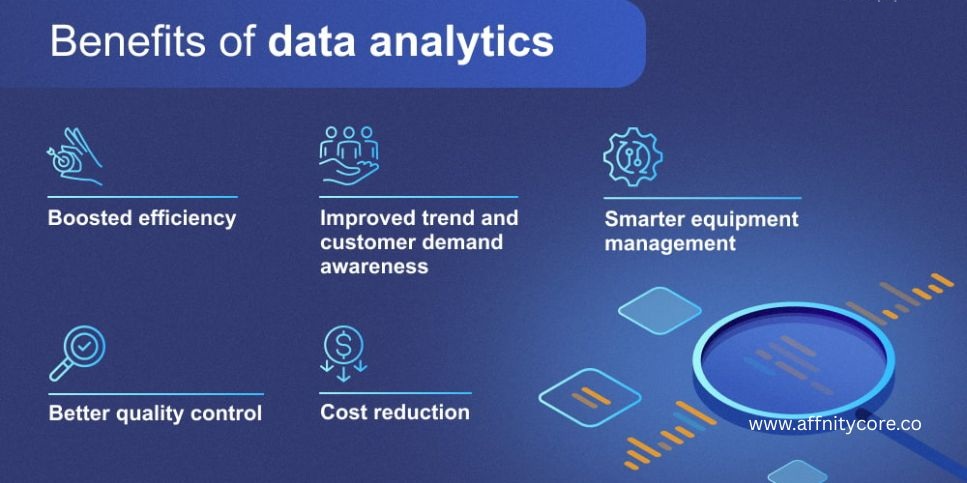
In today’s data-driven healthcare landscape, the benefits of data analytics in business are no longer optional; they’re essential. From improving clinical outcomes to enhancing revenue cycle performance, data analytics empowers organizations to make faster, smarter, and more compliant decisions.
For healthcare providers and revenue cycle professionals, leveraging analytics can mean the difference between operational inefficiency and sustainable growth.
Let’s explore the 15 most impactful benefits of data analytics in healthcare business operations, with a focus on revenue cycle management (RCM), compliance, and billing optimization.
-
Improved Revenue Integrity
One of the most direct advantages of data analytics is its ability to identify revenue leaks. Analytics tools can spot underbilling, upcoding, duplicate charges, and missed procedures. For example, using historical data patterns, AffinityCore helped a client uncover over $170,000 in lost revenue due to recurring errors in CPT code bundling.
-
Faster Claims Processing
By analyzing average denial rates by payer or CPT code, healthcare businesses can streamline how they file and correct claims. This reduces time-to-payment and helps billing teams understand which payers require additional documentation or cleaner submissions.
-
Denial Trend Forecasting
Predictive modeling allows providers to forecast denial trends. When combined with root-cause analysis, organizations can preemptively correct front-end errors, such as eligibility mismatches, before claims are even submitted.
-
Enhanced Compliance Monitoring
Data analytics benefits include more accurate internal auditing. With compliance guidelines from CMS and OIG constantly evolving, analytics ensures real-time monitoring of documentation patterns, flagging anomalies that could raise red flags in an audit.
-
Better Patient Outcomes
Quality of care and financial health go hand in hand. By correlating treatment protocols with outcomes data, providers can adjust services for better clinical and economic results. This is especially critical in value-based care models.
-
Real-Time KPI Tracking
Through dashboards and custom reports, executives can monitor key performance indicators like days in AR, denial rates, or patient pay lag in real-time, improving agility in business decisions.
-
Lower Operational Costs
One of the lesser-mentioned but powerful benefits of data analytics in business is cost control. By analyzing time spent per claim, per FTE, organizations can pinpoint inefficiencies in workflows and reduce manual work through automation.
-
More Accurate Charge Capture
Missed charges remain one of the top revenue cycle issues. Data analytics can automatically scan for inconsistencies between clinical documentation and billed services, reducing lost revenue and audit risk.
-
Physician Performance Insights
From procedure volumes to documentation habits, analytics provides visibility into provider-level trends. This helps with targeted training and ensuring coding accuracy, which directly affects claim approvals and revenue.
-
Optimized Resource Allocation
By understanding historical patient volume, payer mix, and treatment cycles, clinics can better staff departments, reducing overtime costs and improving patient satisfaction.
-
Enhanced Payer Contract Negotiation
Armed with detailed analytics on payer reimbursements and denial rates, healthcare organizations gain leverage in contract renewals. They can identify which payers are underperforming and make data-backed adjustments.
-
Early Identification of Fraud or Abuse
Using anomaly detection, practices can spot irregular billing behavior that might suggest fraud, such as uncharacteristically high volumes of certain high-reimbursing procedures or sudden documentation shifts.
-
Patient Payment Propensity Models
With rising patient responsibility, understanding which patients are likely to pay, and when, is vital. Analytics can guide decisions on payment plan offerings or third-party collections strategies.
-
Revenue Code Accuracy
A common issue in RCM is mismatched revenue codes, often due to human error or outdated fee schedules. With data audits in place, such mismatches were identified and corrected, boosting reimbursement and reducing recoupments.
-
Strategic Growth Planning
Finally, data analytics benefits extend to long-term planning. Whether it’s identifying high-performing service lines, expanding into new geographies, or analyzing patient demographics, analytics provide leadership with clarity to scale strategically through a descriptive data analytics strategy.
Why Healthcare Must Embrace Data Analytics Now
According to HFMA, organizations that adopt robust analytics capabilities see a 15–20% improvement in cash collections and up to 30% fewer denials. CMS and AMA also emphasize data transparency and performance tracking as part of their drive toward value-based care.
In a space where margins are tight and regulations are strict, the advantages of data analytics are far too significant to ignore.
Best Practices and Compliance Considerations
As you adopt more advanced analytics tools, remember to align with HIPAA and data security standards. Ensure access control, encrypted data storage, and audit trails. Work with vendors or partners who fix data quality issues and have both the technology and the regulatory landscape of healthcare.
How AffinityCore Can Support Your Analytics-Driven Growth
At AffinityCore, we don’t just provide medical billing, we provide custom medical billing solutions. Our team combines experienced coders, billing professionals, and analytics consultants who help clients decode complex trends, prevent revenue leakage, and maximize compliance.
From tailored dashboards to predictive modeling of your denial rates, our end-to-end approach empowers you with the data clarity you need to grow confidently and compliantly.
Ready to transform your revenue cycle with smarter decisions?
Let AffinityCore show you what the power of data analytics in business can do for your organization.
Contact us to learn how we can help.
FAQs
Q1: How does data analytics help businesses grow?
Ans. Data analytics helps businesses, from small businesses to large, grow by identifying trends, improving decision-making, optimizing operations, and uncovering new revenue opportunities.
Q2: What are the main benefits of using data analytics in business?
Ans. The main benefits include better customer insights, cost reduction, process efficiency, risk management, and improved strategic planning.
Q3: Why is data analytics important for small businesses?
Ans. For small businesses, data analytics is important because it helps them compete with larger companies, target customers effectively, and make informed choices.
Q4: Can data analytics improve customer experience?
Ans. Yes. By analyzing customer behavior and feedback, businesses can personalize services, enhance satisfaction, and build long-term loyalty.
Q5: What role does data analytics play in decision-making?
Ans. Data analytics provides accurate, evidence-based insights that reduce guesswork, enabling smarter, faster, and more confident business decisions.

